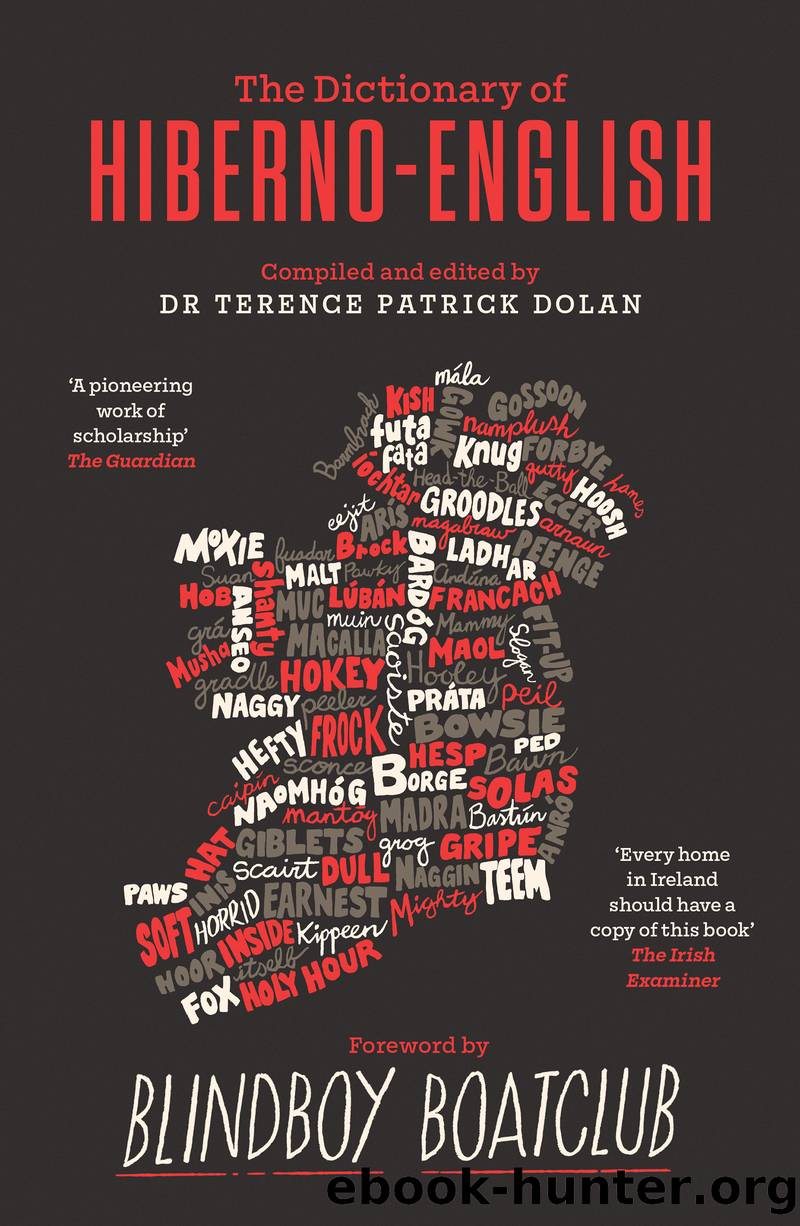A Dictionary of Hiberno-English by Dolan Terence Patrick; Boatclub Blindboy;

Author:Dolan, Terence Patrick; Boatclub, Blindboy;
Language: eng
Format: epub
Publisher: Gill Books
I
iarlais /ËiËrlÉâ«/ n., a person who remains smaller than other members of the same family; the youngest of the family (SOM, Kerry, who writes: âif somebody is referred to as an iarlais there is a hint of delicate health and other-worldliness, as distinct from Ãochtarâ) < Ir.
idir /ËıʤÉr/ prep., in the phr. âDia idir sinn agus an tolcâ, God between us and evil < Ir.
if /if/ conj., âoften used in the sense of although, while, or some such signification. A Dublin jarvey who got sixpence for a long drive, said in a rage: âIâm in luck today; but if I am, âtis blazing bad luckâ; âBill ran into the house, and if he did, the other man seized him round the waist and threw him on his back.ââ (PWJ).
ignorant /ËıgnÉrÉnt/ adj., unmannerly, crude in behaviour. âHeâs from an ignorant familyâ; âDonât be so ignorant and behave yourself.â
ill /ıl/ adj., obstinate, self-willed (cited for Wexford by DOM, IWP, 116, regarding a comment he heard that a certain player in a hurling game was âillâ) < E dial.
in/ın/prep., as in âI am in my standingâ, a literal rendering of Ir táim i mo sheasamh. Joyce, Finnegans Wake, 478.28: âAre you in your [are you a] fatherick, lonely one?â (cf. Ir tá an fear ina bhádóir, the man is a boatman (lit. the man is in his boatman).
-Ãn /iËn/, see -EEN.
inagh /ınËjæ/ int., sarcastic: is that so? < Ir an ea. âIâm only forty.â â âForty, inagh!â Griffin, The Collegians, 136: ââAn I seen your husband there too, maâam.â âMy husband, inagh?â says she.â
inch /ıntâ«/ n., a water-meadow, a strip of grassy land beside a river; any narrow field along the side of a river (SOM, Kerry); a small island < Ir inse. âDrive the cows to the inch.â See INIS.
indulgence /ınËdÎlʤÉns/ n., the remission by the Church of the temporal punishment due to those sins of which the guilt has been forgiven, usually in the sacrament of Penance (i.e. confession); the grace for an indulgence comes from what is known as the Treasury of Merits or Treasury of Satisfaction of the Church, a superabundant store of the merits of Christ, the Blessed Virgin Mary, and of the Saints, which were beyond the needs of the salvation of humanity, and which could, therefore, be used for the remission of temporal punishment due to forgiven sin; indulgences may be either plenary (an indulgence which remits the whole of the temporal punishment due for an individualâs sins) or partial (indulgences which remit a part of the punishment due for sin at any given moment, expressed in human terms of time, e.g. three hundred days, seven years, etc.); there are many short indulgenced prayers, e.g. the invocation of the prayer âQueen of the most holy Rosary, pray for usâ will receive three hundred days, âHail, O Cross, our only hopeâ five hundred days, and so forth; the precise significance of these designated periods of time has never been defined; suffice it to say that the possibility
Download
This site does not store any files on its server. We only index and link to content provided by other sites. Please contact the content providers to delete copyright contents if any and email us, we'll remove relevant links or contents immediately.
Periodization Training for Sports by Tudor Bompa(7991)
The Body: A Guide for Occupants by Bill Bryson(4693)
The MacArthur Bible Commentary by John MacArthur(4666)
The Sports Rules Book by Human Kinetics(4136)
What It Really Takes to Get Into Ivy League and Other Highly Selective Colleges by Hughes Chuck(3581)
Marijuana Grower's Handbook by Ed Rosenthal(3547)
The Sprouting Book by Ann Wigmore(3458)
The Martian by Andy Weir(3219)
Salt, Fat, Acid, Heat: Mastering the Elements of Good Cooking by Nosrat Samin(3034)
The Bread Bible by Rose Levy Beranbaum(2928)
Sapiens and Homo Deus by Yuval Noah Harari(2895)
Classic by Mary Berry(2874)
Harry Potter 4 - Harry Potter and The Goblet of Fire by J.K.Rowling(2861)
The Marketing Plan Handbook: Develop Big-Picture Marketing Plans for Pennies on the Dollar by Robert W. Bly(2845)
Martha Stewart's Baking Handbook by Martha Stewart(2706)
The Plant Paradox by Dr. Steven R. Gundry M.D(2468)
Screenplay: The Foundations of Screenwriting by Syd Field(2463)
50 Economics Classics by Tom Butler-Bowdon(2442)
The Cambridge Grammar Of The English Language by Rodney Huddleston Geoffrey K. Pullum(2335)
